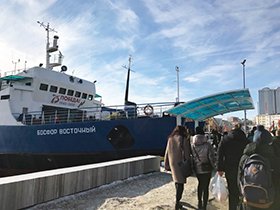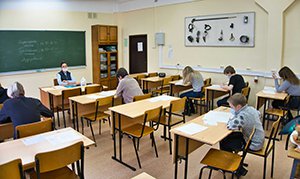The Japanese-Language Proficiency Test During the Coronavirus Crisis
Far Eastern Federal University
SHIMOGORI Takeshi
To Russian learners, the Japanese-Language Proficiency Test (hereinafter the “JLPT”) is not “just an exam.” It's a requirement for employment and studying in Japan; it’s also useful for people to check their Japanese-language level, and the exam itself has become a learning target. It can even persuade the guardians of children who are learning the Japanese language to allow their children to keep studying.
The JLPT is held in 13 cities in Russia. In the summer of 2020, it was cancelled all over the world, and although the December exam was cancelled in several cities, it was safely held in Vladivostok, thanks to the persistence of the Consulate-General. It was also held in Kamchatka—and was the first foreign examination to be held in this area.

A ferry connecting Russky Island with the mainland
Vladivostok
The Consulate-General of Japan in Vladivostok uses the Far Eastern Federal University as a venue to hold the JLPT. The University started holding face-to-face classes in September 2020, and so the December exam should have been held with no issues. However, around 10 days before exam day, the city was struck by a storm of mixed snow and rain, and everywhere in the city was engulfed in ice in one night. Most of the trees couldn't bear the weight and fell over, and in the badly-hit areas, water outages and power cuts continued for a month. Fortunately, the University, the venue for the JLPT, was undamaged, but there was a danger of ice falling from the wires that suspend Russky Bridge, which links Russky Island (where the University is located) and the mainland, and so the bridge was closed and the University was only accessible by ferry. The Consulate-General and the University discussed holding the exam on the island right up until the day, but there is only one ferry once every two hours and it takes almost two hours one way, so we judged that it would be difficult to take the examination materials to the University, and, most of all, for children to take a ferry to the island, so we hurriedly searched for an alternative venue in the city. Then, School No. 51, which has a long history of Japanese-language education, came forward. Japanese language teachers and the teachers of School No. 51 worked to supervise the exam, which was held without incident. The students who live in the dormitories on Russky Island had to come to the venue via an early-morning ferry, but they are young and strong, so there were no problems.

The JLPT in Kamchatka
Kamchatka
Japanese-language education flourished in Kamchatka from the ’90s, and for a time there were a number of teachers from Japan—this was an area that aimed to follow Moscow and Vladivostok as a hub for Japanese-language education. However, since around 2010, when the number of young Russians began to drop sharply, it has lost its momentum. Japanese-language education vanished as a major subject in its universities, and the number of learners substantially decreased.
To the Russian people, Kamchatka is a longed-for destination, with a rich natural world. Although it is visited by many foreigners, the interpreting guides used there now come from Moscow and Vladivostok. To improve this state of affairs, the Kamchatka Association of Translators and Teachers of Foreign Languages (hereinafter “Kappiya”) was set up in 2018, and came to the Japan Foundation to discuss holding the JLPT as the first step toward revitalizing the area. I visited Kamchatka twice in 2019, and observed the state of local Japanese-language education, looked over places for the venue, and explained the work needed to hold the exam. The quality and the quantity of university Japanese-language education was certainly deteriorating, and there was no Japanese-language education at all in any schools that offer primary or secondary education. However, several private language schools offered Japanese-language education for adults as well as children, and lots of learners seemed to enjoy giving presentations in the Japanese language during the Japanese speech contest, despite being nervous. Kappiya, the organization implementing the exam, was an admirable organization brought together by its representative Oleg, an expert in negotiations; Alexander who worked as a Russian-Japanese interpreter and an actor on the movie The Prisoner of Sakura; and Maria, who has been highly rated as an interpreter-guide for many years. With the understanding of the Consulate-General of Japan in Vladivostok, it was decided to hold the JLPT here from December 2020.
Kamchatka is a peninsula, but it is not possible to come and go from here to other cities via land. Most travel takes place on planes, and in the past, learners had to go to Vladivostok or Khabarovsk to take the exam. Including the cost of accommodation, this required a sum of money close to the average monthly salary of a person in Russia, so it was more-or-less impossible to take the exam. Not even an English-language exam, such as TOEIC, had ever been offered here. Naturally, there was a lot of anticipation toward the holding of the JLPT, but at the same time there was also unease coming from every side. I spoke to a lot of different people, and there were even some who said, “It would be better not to hold the exam,” to my face. We also had the issue of the venue becoming unusable right before the exam. However, thanks to Kamchatka State Technical University, which provided a venue for us despite the coronavirus crisis, and the municipal government, which permitted us to hold the exam, and, above all, the efforts of Kappiya in persistently negotiating with every side and making preparations over a two-year period, 46 people took the JLPT.
“It's just a test, but it is a test” is a well-worn phrase, but it truly is as this phrase says. Even before I applied myself to my work as a Japanese-Language Specialist dispatched by the Japan Foundation, I had always focused on the “exam” itself from the perspective of Japanese-language teachers instructing examinees. However, it’s not just the examinees and the Japanese-language teachers, who create it and prepare for it, who are involved in the exam. I felt that all of the people involved in the JLPT will surely play an active role as contributors who will help build the future relationship between Japan and Russia.
- What We Do Top
- Arts and Cultural Exchange [Culture]
- Japanese-Language Education Overseas [Language]
- Japanese-Language Education Overseas [Language] Top
- Learn Japanese-language
- Teach Japanese-language
- Take Japanese-Language Test
- Know about Japanese-language education abroad
- The Japanese-Language Institute, Urawa
- The Japanese-Language Institute, Kansai
- Japanese-Language Programs for Foreign Specified Skilled Worker Candidates
- Japanese Language Education for Japanese Children Resident Overseas and for the Descendants of Migrants
- Archives
- Japanese Studies and Global Partnerships [Dialogue]
- JF digital collection
- Other Programs / Programs to Commemorate Exchange Year
- Awards and Prizes
- Publications
